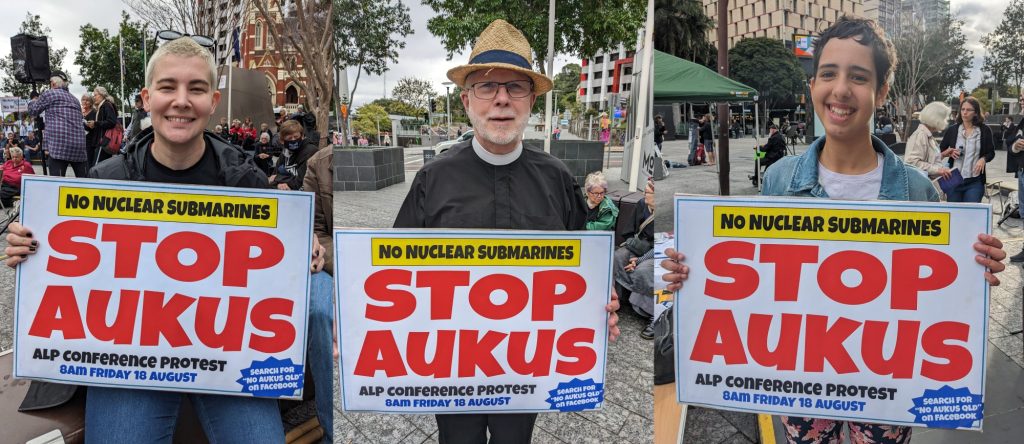On Friday 18 August, beginning at 8 am, the Queensland No-AUKUS Coalition will hold a demonstration on the second morning of the 2023 National ALP Conference outside the Brisbane Convention Centre. Those interested in joining are invited to gather at the main entrance stairs of the Centre at the corner of Merivale and Glenelg Streets. The purpose of the demonstration is to emphasis the strength of public opposition to the notorious AUKUS pact. Local and interstate speakers will address the rally which has been endorsed by organisations that include the Electrical Trades Union, Labor Against War, the Union of Australian Women, Wage Peace and the Independent and Peaceful Australia Network.
In a surreal turn, the AUKUS pact sees Australia enter into a so-called ‘security’ agreement with the US and UK, two disintegrating former imperial powers. While the agreement involves much more, the focus of public attention has been the obscene expenditure of approximately 368 billion dollars on nuclear powered submarines. These monies, sure to balloon even further, will go into the coffers of already bloated weapons manufacturers. The AUKUS project developed on the advice of what University of Sydney Professor Emeritus Stuart Rees notes are ‘retired US admirals’ and ‘inaccessible Canberra based, alleged expert think tanks’.
Secrecy – always justified in terms of national security, as when Robert Menzies supinely agreed to the British use of Australian sites such as Maralinga for nuclear testing without even Cabinet let alone Parliamentary consultation – is used to conceal poor decision-making. This results in priorities completely detached from the public good. –
AUKUS must be opposed on various grounds including the blatant waste of public funds that should be used for health, public education and housing, aged care, environmental protection and combatting climate change. Members of the broader peace movement in this country support the right of the Australian government to develop policies to defend Australian territory from attack. The AUKUS submarines, and the AUKUS agreement generally, do not play that role. Powered by weapons-grade uranium, these submarines are designed for deepwater operations completely unsuitable for patrolling or protecting the shallow waters off the Australian coast. In other words, they are designed to stalk deep waters, such as the depths of the South China Sea, as part of some imagined future conflict being confected principally by the United States. While there might be secrecy around AUKUS, there is no secrecy that the alleged future enemy is China.
When rejecting AUKUS and other militarization that includes the vastly expanded US presence in Australia’s north and preparations at Tindall Airbase to house US Air Force B-52s with nuclear warhead capabilities, we must also reject the spurious discourse of jobs. Australia does not need jobs created through the manufacture of weapons and related industries. We need job creation in aged care, public education, housing, health and those areas that contribute to the well-being of every Australian – not just a handful of the cronies of weapons manufacturers.
The substance that will drive the AUKUS submarines is highly enriched, weapons grade uranium, which Australia will have to store in-perpetuity. Writing on the Breaking Defence website on 7 March 2023, Alan J. Kuperman from the Nuclear Proliferation Prevention Project at the University of Texas at Austin, referred to this as ‘the most dangerous substance on earth’
In response to the outcry against the use of this material, the Australian government claims that it ‘will not enrich uranium or reprocess spent fuel from the submarines’ (Guardian on-line 14 March 2023). This distracts from the threat presented. As Kuperman points out: ‘The precedent of [a state like Australia that has pledged to not acquire nuclear weapons] acquiring tons of weapons-grade uranium could unravel the global nonproliferation regime, because other countries would demand the same right.’
Unravelling the global non-proliferation regime can only heighten the risk of another nuclear catastrophe on this precious planet. To understand the almost unimaginable implications of such an event we should listen to the pleas of Hiroshima atomic bomb survivor (hibakusha) Setsuko Thurlow. Setsuko was 13 and in Year 8 when the Enola Gay dropped its grotesque payload on her home city on the morning of 6 August 1945. To know her story is to understand the annihilation of humanity that will follow a twenty-first century nuclear event. Speaking on a 3 August (US time) Bulletin of Atomic Scientists sponsored webinar entitled ‘Building a Safer Future from our Nuclear Past,’ Setsuko spoke of the 7 or 8 thousand students who were ‘carbonized, incinerated’ by the blast. She explained that people were killed not just by the intensity of the heat. They were also killed by radiation, the external symptoms of which were not immediately visible. She told of being so happy that relatives survived the bomb, until purple splotches appeared on their bodies a week later before they eventually passed away. That suffering and its effects continue to the present day.
Setsuko pointed out how the aftermath of the atomic bomb, especially with Japan’s surrender and the US Occupation of Japan, was marked by false information, misinformation, secrecy and lies that trivialized the impact. She also recalls from personal experience how those who suffered most from this ‘indiscriminate atrocity’ and who were victimized in the most horrific way were mainly children like herself, women and the elderly. All able-bodied men were in war zones.
Setsuko’s words can be applied to the AUKUS debacle also. The Australian public has been insulted with an onslaught of false information, misinformation, secrecy and lies that trivialize the impact of the decision. We are told it is necessary for the nation’s security when the greatest threat to the security of all humanity is climate change. We are told that China is a threat when such a claim can only be made because a false image of China has been artfully constructed by those who will profit most from war. When caution is urged, we are told ‘the world has changed.’ Yes, the world has certainly changed. Anthony Albanese, once a strong anti-nuclear proponent, now cavils at putting the government’s signature to Treaty on the Prohibition of Nuclear Weapons. One ALP condition for signing the TNWP is having an ‘effective verification and enforcement architecture’ in place. This is something that the almost 60-year-old Nuclear Non-Proliferation Treaty, which the nuclear states happily thumb their noses at, has struggled to achieve. In other words, Anthony Albanese and the ALP have imposed an unnecessarily complicated condition on becoming a signatory to the Treaty on the Prohibition of Nuclear Weapons.

While the Morrison administration signed Australia up to AUKUS, it has been the ALP administration that has accelerated Australia’s involvement in this and other developments. These include an exponential increase in US troop numbers in Australia’s north and the more-or-less permanent stationing of B-52 aircraft on so-called ‘rotation’ from the US. We are thus being brought ever closer to the United States and its status as a nuclear state. To be a nuclear state is to have the potential, in the worlds of J. Robert Oppenheimer as cited from the sacred Hindu text the Bhagavad Gita, ‘To Become Death, the Destroyer of Worlds.’
We must reject this position to side with Setsuko Thurlow who pleads that we be allowed to live. She personally witnessed the mass atrocity committed against noncombatants who disappeared before her very eyes. And that, as she notes, was with one ‘primitive’ atomic bomb. What would be impact be today with weapons so much more technologically advanced?
We urge all who agree with Setsuko to come to the Anti-AUKUS demonstration being held outside the ALP National Conference on the morning of Friday 18 August commenting at 8 am. Come if you have a strong sense of responsibility for co-existence on this planet. Come if you want to hold the current government responsible for their actions. We must refuse to play bit parts in what Setsuko refers to as government games. We must reject notions of mutually assured destruction that underpin current policies and assert our right to live in peace.
Source : Westender











